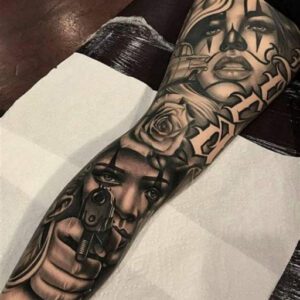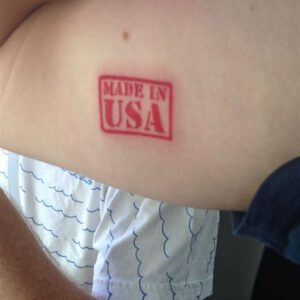Forearm tattoos have become increasingly popular in recent years, but it’s important to consider the potential drawbacks before getting one. Forearms are a prominent area of the body, and a tattoo there will be visible in most situations. This can be a problem if you work in a conservative profession or have a job that requires a lot of public interaction.
Another consideration is the fact that tattoos are permanent. While some people may enjoy their forearm tattoo for years to come, others may regret it down the road. It’s important to be sure you’re making the right decision before getting a tattoo, especially in such a visible location.
Potential Drawbacks of Forearm Tattoos
There are several potential drawbacks to getting a forearm tattoo. These include:
- Visibility: Forearm tattoos are highly visible, which can be a problem in certain professions or social situations.
- Regret: Tattoos are permanent, and there is always the possibility that you may regret getting one in the future.
- Pain: Forearms are a relatively bony area, which can make getting a tattoo there more painful than in other areas of the body.
- Sun exposure: Forearm tattoos are exposed to the sun more than other areas of the body, which can cause them to fade or become damaged over time.
Considerations for Getting a Forearm Tattoo
If you’re considering getting a forearm tattoo, there are a few things you should keep in mind. These include:
- Placement: Carefully consider where you want your tattoo to be placed on your forearm. You’ll want to choose a spot that is visible but not too conspicuous.
- Design: Choose a tattoo design that you love and that has personal meaning to you. You’ll be looking at this tattoo for the rest of your life, so make sure it’s something you’re happy with.
- Artist: Do your research and choose a reputable tattoo artist who has experience with forearm tattoos. A good artist will be able to help you create a tattoo that you’ll love.
- Aftercare: Follow the artist’s instructions for aftercare to ensure that your tattoo heals properly.
- Cost: Forearm tattoos can be expensive, so be sure to factor in the cost before getting one.
Conclusion
Forearm tattoos can be a great way to express yourself, but it’s important to weigh the pros and cons before getting one. If you’re prepared for the potential drawbacks, then a forearm tattoo could be a beautiful and meaningful addition to your body.
Ultimately, the decision of whether or not to get a forearm tattoo is a personal one. If you’re considering getting one, take your time, do your research, and choose a design that you love.
FAQ
Are forearm tattoos unprofessional?
Whether or not forearm tattoos are unprofessional depends on the specific tattoo and the context. In some professions, such as law or medicine, visible tattoos may be frowned upon. However, in other professions, such as the arts or entertainment, tattoos may be more acceptable.
How painful are forearm tattoos?
The pain level of a forearm tattoo varies depending on the individual’s pain tolerance and the size and location of the tattoo. However, forearms are generally considered to be a relatively bony area, so getting a tattoo there can be more painful than in other areas of the body.
How much do forearm tattoos cost?
The cost of a forearm tattoo varies depending on the size, complexity, and location of the tattoo, as well as the experience and reputation of the artist. However, you can expect to pay anywhere from $100 to $500 for a small to medium-sized forearm tattoo.
How do I care for a forearm tattoo?
After getting a forearm tattoo, it’s important to follow the artist’s instructions for aftercare. This will typically involve keeping the tattoo clean and dry, avoiding sun exposure, and applying a thin layer of moisturizer to the tattoo.
Can I get a cover-up tattoo on my forearm?
Yes, it is possible to get a cover-up tattoo on your forearm. However, the success of a cover-up tattoo depends on a number of factors, such as the size, color, and location of the original tattoo. A skilled tattoo artist will be able to assess your original tattoo and determine if a cover-up is possible.



